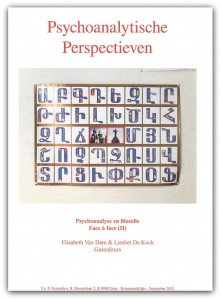Vol. 30 (3) 2012
Deleuze reads Sade and Sacher-Masoch
– Lode Lauwaert
From Vis Viva to Bewegungskraft [motion force]. Freud’s Concept of “Psychic Energy” historicized
– Liesbet De Kock
Psychoanalysis and Philosophy of History: Frank Ankersmit and Eelco Runia on the Relation Between Past and Present
– Anton Froeyman
“Melancholy as a Narcissistic Neurosis in Kristeva’s Soleil Noir”
– Joannes Késenne
Destructive Passion: Freud’s Metapsychology of Hate in “Instincts and their Vicissitudes”
– Jens De Vleminck
ARCHIEFTEKST
I. Kant, Beantwoording van de vraag: wat is Verlichting? [text]
“I don’t stop; I start again.” The position of the analyst in ‘long term care’
From a lacanian orientation, the relation between 'treatment', 'coaching' and 'care' is questioned in case of what one calls 'long term care'. This question is approached from the perspective of a case study. A young man accuses himself constantly of not adapting...
Vampires, Viruses and Verbalisation: Bram Stoker’s Dracula as a genealogical window into fin-de-siècle science
This paper analyses Bram Stoker’s classic Dracula as a literary document which reflects important scientific and technological developments of the fin-the-siècle era, ranging from blood transfusion and virology via psychotherapy and psychoanalysis up to brain research...
Psychoanalysis: a symptomatic problem
In this article the author explores why psychoanalysts are often seen as troublesome people and why they give so much critique. Foucault stated that in modernity the epistèmè changed: ‘man’ came in the thinking frame and human sciences were born. In his opinion...
The Violence of Right: Rereading ‘Why War?’
In this contribution, the often neglected correspondence ‘Why War?’ (Freud, 1933b) is presented as the locus classicus of Freud’s account of ‘Right and Violence’. In the discussion with Freud, Einstein’s position appears in the light of Kant’s Toward Perpetual Peace....
Destructive Passion: Freud’s Metapsychology of Hate in “Instincts and their Vicissitudes”
This contribution proposes that Freud, in "Instincts and their Vicissitudes" (1915c), develops a separate metapsychology of hate for the first time. Freud does not only distinguish hate from sadism and masochism, but also renounces his former opinion about hate as a...
“Melancholy as a Narcissistic Neurosis in Kristeva’s Soleil Noir”
Julia Kristeva approaches melancholia starting from Freud's basic intuitions but she places it within a conceptual framework that pays lip service to semiotics and Lacan. In that sense she argues that one of the most distinctive characteristics of the melancholic is...
Psychoanalysis and Philosophy of History: Frank Ankersmit and Eelco Runia on the Relation Between Past and Present
In this paper, the author discusses the relation between psychoanalysis and philosophy of history. He talks about the influence of psychology and psychoanalysis on Frank Ankersmit and Eelco Runia, two central figures in contemporary philosophy of history. According to...
From Vis Viva to Bewegungskraft [motion force]. Freud’s Concept of “Psychic Energy” historicized
As suggested by Ricoeur (1965) the exact sciences have often provided the language by means of which Freud articulated the psychic apparatus, although the articulation itself is irreducible to the physico-physiological level. It is well known that in Jenseits des...
Deleuze reads Sade and Sacher-Masoch
Many psychoanalysts argue that clinicians have a lot to learn from literature. They share the deep-rooted conviction that artists are sensitive to clinical phenomena and that they make visible what is often overlooked by clinicians. Freud, for example, relies on...
